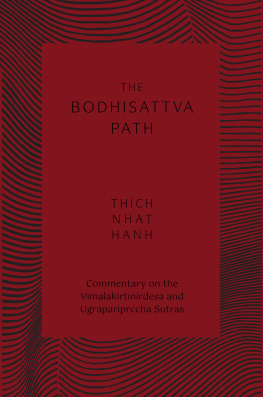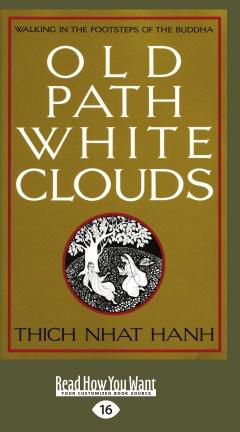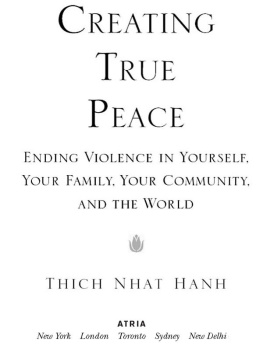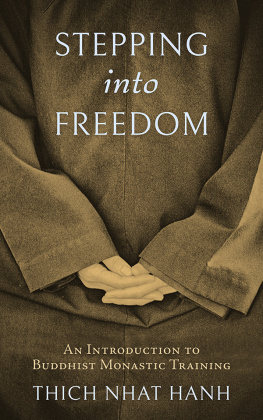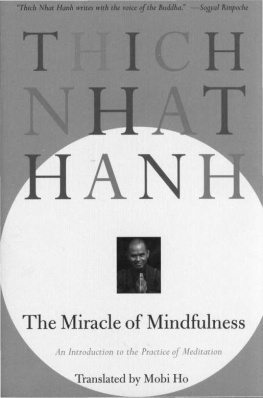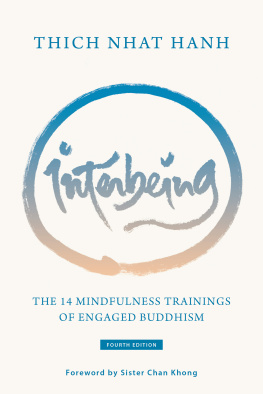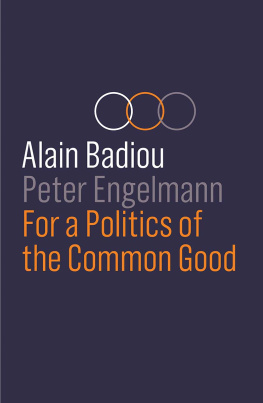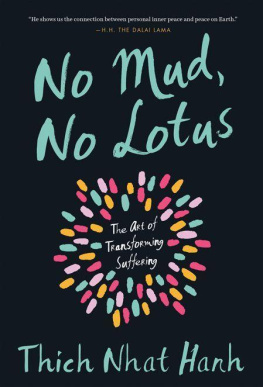GOOD CITIZENS
CREATING ENLIGHTENED SOCIETY
GOOD
CITIZENS
CREATING
ENLIGHTENED
SOCIETY
Thich Nhat Hanh

PARALLAX PRESS
BERKELEY, CALIFORNIA
Contents
GOOD CITIZENS
CREATING ENLIGHTENED SOCIETY
T HE WORLD in which we live is globalized. Economies halfway around the world affect our own. Our politics, education, and cultural consumption happen on a global scale. Our ethics and morality also need to be globalized. A new global order calls for a new global ethic. A global ethic is the key to addressing the true difficulties of our time.
Around the world, we are facing climate change, terrorism, and wars between people of different religions. Fanaticism, discrimination, division, violence, economic crises, and the destruction of the environment affect us all. We have to look deeply into these sufferings so we can make good decisions and conduct ourselves wisely. We have to sit down together, as people of many traditions, to find the causes of global suffering. If we look deeply with clarity, calm, and peace, we can see the causes of our suffering, uproot and transform them, and find a way out.
A GLOBAL OFFERING
We are many different cultures and nations, each with its own values, ways of behaving, and criteria for ethical conduct. Every country and every culture can offer something beautiful. It will take all of our collective wisdom to make a global code of ethics. With insight from all the worlds people and traditions, we can create a global ethic that is based on mutual respect.
Some people base their ethics on their religion. If you believe there is a deity that decides what is right and wrong regardless of what you observe, then you only need to follow the rules laid out by that religion to engage in right action. Others follow a scientific or utilitarian approach, looking only at what is a logical consequence of their actions. A Buddhist contribution to global ethics is different from both of these. It is based on observing and understanding the world with mindfulness, concentration, and insight. It begins with an awareness of the nonduality of subject and object, and the interconnectedness of all things. It is a practice that can be accepted by everyone, regardless of whether or not you believe in a god. When you train yourself in this practice, you will see that you have more freedom.
APPLYING BUDDHIST ETHICS IN DAILY LIFE
We created the term Engaged Buddhism during the the Vietnam War. As monks, nuns, and laypeople during the war, many of us practiced sitting and walking meditation. But we would hear the bombs falling around us, and the cries of the children and adults who were wounded. To meditate is to be aware of what is going on. What was going on around us was the suffering of many people and the destruction of life. So we were motivated by the desire to do something to relieve the suffering within us and around us. We wanted to serve others and we wanted to practice sitting and walking meditation to give us the stability and peace we needed to go out of the temple and help relieve this suffering. We walked mindfully right alongside suffering, in the places where people were still running under the bombs. We practiced mindful breathing as we cared for children wounded by guns or bombs. If we hadnt practiced while we served, we would have lost ourselves, become burnt out, and we would not have been able to help anyone.
Engaged Buddhism was born from this difficult situation; we wanted to maintain our practice while responding to the suffering around us. Engaged Buddhism isnt just Buddhism thats involved in social problems. But engaged Buddhism means we practice mindfulness wherever we are, whatever we are doing, at any time. When we are alone, walking, sitting, drinking our tea, or making our breakfast, that can also be engaged Buddhism. We practice this way not only for ourselves but also to preserve ourselves so that we are able to help others and be connected with all life. Engaged Buddhism is not just self-help. It helps us feel stronger and more stable and also more connected to others and committed to the happiness of all beings.
Engaged Buddhism is Buddhism that penetrates into life. If Buddhism is not engaged, its not real Buddhism. This is the attitude of the bodhisattvas, beings whose whole intention and actions are to relieve suffering. We practice meditation and mindfulness not only for ourselves; we practice to relieve the suffering of all beings and of the Earth itself. With the insight of interbeingthat we are inherently interconnected with all other beingswe know that when other people suffer less, we suffer less. And when we suffer less, other people suffer less.
Now, as well as Engaged Buddhism, we are using the term Applied Buddhism. Applied is a word that is often used in science, and we deliberately use it here as a way of saying that our understanding of reality can be used to help clarify and find a way to transform every situation. In Buddhism, there is something that can be used in every circumstance to shed light on the situation and help solve the problem. There is a way to handle every situation with compassion and understanding so that suffering can be lessened. That is the essence of Applied Buddhism.
THE STARTING POINT FOR A BUDDHIST ETHIC
Mindfulness is the basis of a Buddhist Ethic. What does being mindful mean? It means, first of all, that we stop and observe deeply what is happening in the present moment. If we do this, we can see the suffering that is inside us and around us. We can practice looking deeply with concentration in order to see the causes of this suffering. We need to understand suffering in order to know what kind of action we can take to relieve it. We can use the insight of others, the mindfulness of our Sanghaour larger community of practitionersto share our insight and understand what kind of action can lead to the transformation of that suffering. When we have collective insight, it will help us see the mutually beneficial path that will lead to the cessation of suffering, not only for one person, but for all of us.
THE VIRTUOUS PATH
In Vietnamese, we translate ethics as dao duc, the virtuous path. Duc means virtue in the sense of honesty, integrity, and understanding. The word is small but it implies a lotforgiveness, compassion, tolerance, and a sense of common humanityall the good things that everyone needs. The path should be able to provide the kind of virtuous conduct that will help us to transform and to bring a happy life to everyone. When we have the characteristics of someone who is virtuous, we dont make people suffer. This kind of virtue offers us a guideline, a way of behaving that doesnt cause suffering to others or to ourselves.
Another way to translate ethics is luong li, which means the behavior of humans to each other. Luong means the morality of humans and li means the basic principles that lead to correct behavior and correct action. When you put the two phrases together, you get dao li luong thuong, which means moral behavior that everyone agrees to. Thuong means common, ordinary, something everybody can accept, about which theres a consensus. Ethics are something consistent; they dont change from day to day. So this means a kind of permanent ethics, basic principles we can agree upon that lead to more understanding and acceptance.
MINDFULNESS, CONCENTRATION, AND INSIGHT
From the time of his first teaching delivered to his first disciples, the Buddha was very clear and practical about how we can transform our difficulties, both individually and collectively. He focused on how we put the teachings into practice in our everyday lives. That is ethics. Practice is key because practice generates mindfulness, concentration, and insight. These three energies are the foundation of all Buddhist practice and Buddhist Ethics. We cannot speak about Buddhist Ethics without speaking of these three energies. Mindfulness, concentration, and insight help us build a path that will lead to peace and happiness, transformation and healing. It is so important that we dont focus on ethics in the abstract. Our basic practice is the practice of generating the energy of mindfulness, concentration, and insight. We rely on our insight to guide us and help us bring compassion, understanding, harmony, and peace to ourselves and to the world.
Next page

